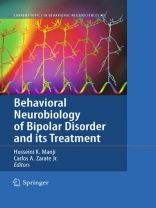This book offers the most up-to-date information about research surrounding the neurobiology of bipolar disorder as well as currently available and novel therapeutic options. The volume has assembled a widely respected group of preclinical and clinical researchers who bring their expertise to bear upon this illness by reviewing cutting-edge research and clinical evidence regarding the pathophysiology and treatment of bipolar disorder. Early chapters review the course and outcome and genetics of this highly heritable condition, including chapters on epigenetics and clinical endophenotypes. Several chapters offer a remarkably thorough and unique overview of the neurobiology of the disorder, including what is known from neuroimaging work and the development of animal models. Finally, the book covers treatment strategies for bipolar disorder, including both traditional and novel therapeutics, as well as non-pharmacological treatments. It offers both researchers and clinicians key insights into this devastating disorder.
Inhoudsopgave
From the contents.- Preface.- Course and Outcome of Bipolar Disorder.- Genetics of Bipolar Disorder.- Epigenetic factors in Bipolar Disorder.- Clinical Endophenotypes in Bipolar Disorder.- Animal Models for the Study of Bipolar Disorder: Endophenotype and Lesion-Based Models.- Animal Models for the Study of Bipolar Disorder: Genetic-Based Models.- The Role of the –aminergic Systems in the Pathophysiology of Bipolar Disorder.- The Role of the GABAergic and Glutamatergic Systems in the Pathophysiology of Bipolar Disorder.- The Role of Signal Transduction Pathways in the Pathophysiology of Bipolar Disorder.- The Role of Synaptic and Neural Plasticity in the Pathophysiology of Bipolar Disorder.- Mitochondrial Dysfunction and Bipolar Disorder.- Structural Neuroimaging and Neuropathological Findings in Bipolar Disorder.- Functional Neuroimaging Findings in Bipolar Disorder: A Developmental Perspective.- Sleep and Biological Rhythm Abnormalities in the Pathophysiology of Bipolar Disorder.












